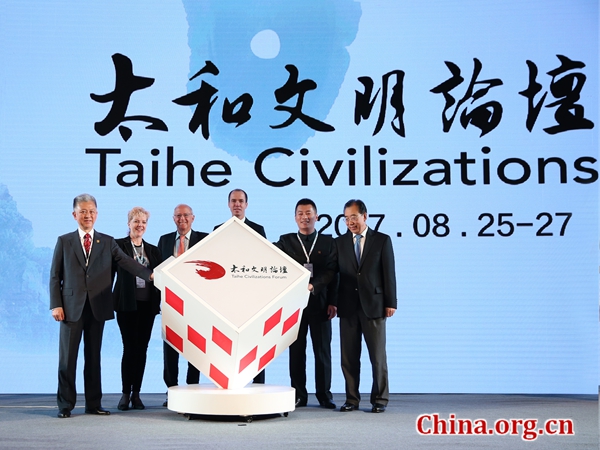Openness and cooperation vital for solution of IP issues: WIPO official
History tells us that maintaining an open and cooperative attitude toward difficulties in the China-US relationship regarding intellectual property rights plays a crucial role in achieving win-win results, according to a senior official at World Intellectual Property Organization (WIPO) in Beijing on Saturday.
Speaking at a session about people-to-people exchanges and U.S.-China relations during the Taihe Civilizations Forum, Chen Hongbing, director of the WIPO China Office, underlined openness and cooperation in solving the simmering Sino-American friction following a U.S. decision to launch a Section 301 investigation into China’s intellectual property (IP) practices.
|
|
|
Taihe Civilizations Forum is held in Beijing from Aug. 25 to 27. [Photo/China.org.cn] |
Over the past 38 years since China was first introduced to the idea of intellectual property and joined the WIPO, it has established its own IP system fully integrated into the global IP framework, and more importantly, had included IP protection in national strategy, Chen said.
According to the latest release from WIPO, Chinese patent filings, accounted for over 38.1 percent of the world’s total applications in 2015, followed by the U.S. and Japan with 20.4 percent and 11 percent.
Moreover, China accounted for a third of the entire world’s trademark filing activity and around 49.7 percent of industrial design filings.
China has gradually become the world’s largest IP creator and owner, Chen stressed.
Earlier this year, attorney and consultant Wayne P. Sobon, former president of the American Intellectual Property Law Association, wrote an opinion article entitled “The surprising rise of China as IP powerhouse,” declaring that “China is quickly becoming a, if not the, global leader of intellectual property protection and enforcement.”
“Just as Western democracies (especially the United States) have grown increasingly skeptical of the value of intellectual property and weakened protection and enforcement, China has been steadily advancing its own intellectual property system and the protected assets of its companies and citizens,” Sobon wrote.
China’s courts accepted an astounding 109,386 civil intellectual property cases in 2015 (6 percent up year-on-year), including more than 11,000 patent cases. By comparison, the number of patent litigations filed in the United States in 2015 was 5,830 (down from the high-water mark of 6,114 in 2013). IP-related litigations totaled around 14,500 cases (including about 5,000 copyright and about 3,500 trademark actions).
In response to the latest U.S. investigation, the Ministry of Commence of China said that Beijing considered it symbolic of unilateralism and protectionism, and the Chinese government would take all necessary measures to protect the legitimate rights of China and Chinese enterprises.
As an U.N. agency, WIPO believes members could maintain and enhance mutually-beneficial, transparent and rule-based collaboration in the IP field as long as they retained an open and cooperative attitude to each other, Chen said.
